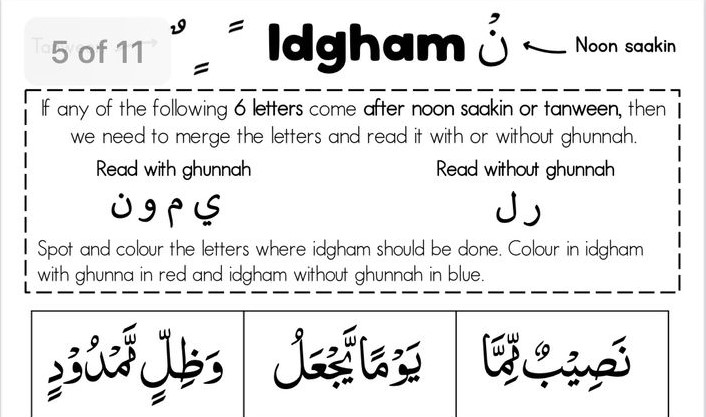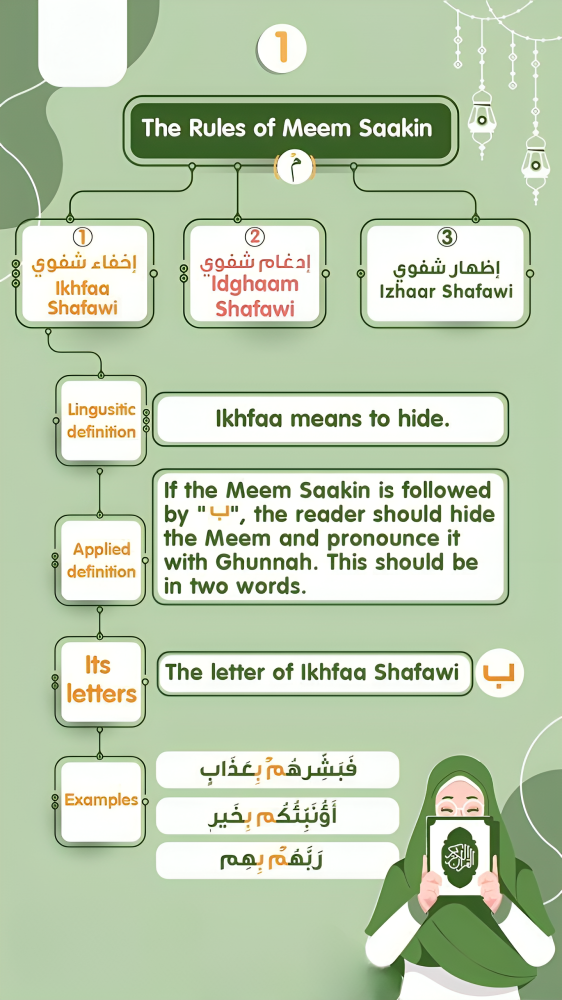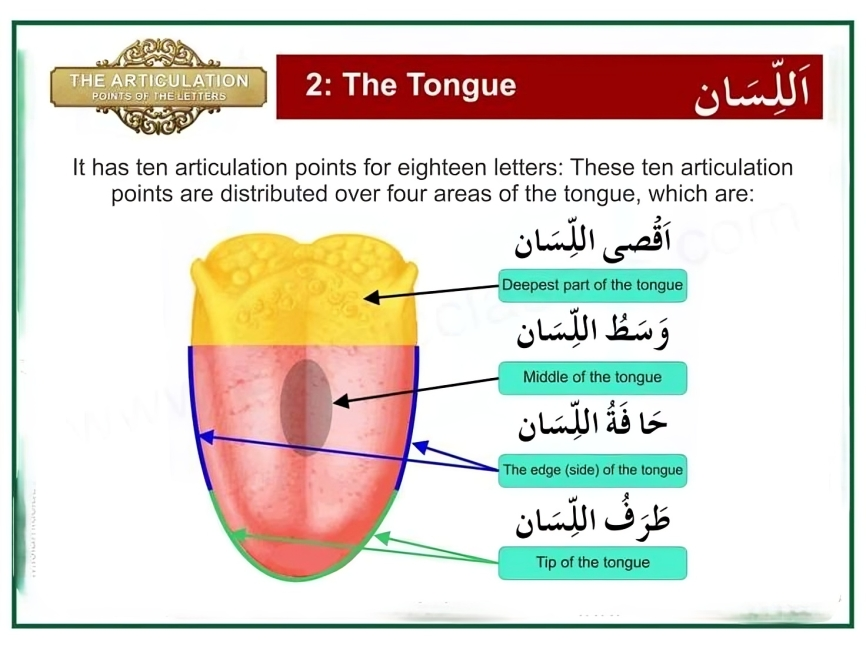Introduction
Idgham (الإدغام), literally meaning “merging” or “assimilation,” is one of the essential rules in Tajweed science. This principle ensures the proper pronunciation of letters when they meet under specific conditions, contributing to the melodious flow and accurate recitation of the Holy Quran.
Understanding Idgham
Definition
Idgham occurs when two letters meet, and the first letter merges into the second, resulting in a stressed (mushaddad) second letter. This merging creates a seamless flow in pronunciation while maintaining the meaning and integrity of the Quranic text.
Categories of Idgham
- Based on Noon Sakin and Tanween
- Idgham with Ghunnah (with nasalization)
- Idgham without Ghunnah (without nasalization)
- Based on Letter Similarity
- Idgham Mutamathelain (identical letters)
- Idgham Mutajanisain (similar articulation points)
- Idgham Mutaqaribain (close articulation points)
Detailed Analysis of Each Type
1. Idgham with Noon Sakin and Tanween
A. Idgham with Ghunnah
Letters: يَنْمُو (Ya, Noon, Meem, Waw)
- Examples:
- مَنْ يَّقُولُ → Man Yaqulu
- مِنْ نِّعْمَةٍ → Min Ni’matin
- خَيْرٌ مِّنْ → Khairum Min
- عَذَابٌ وَّلَا → ‘Athabuw Wala
Duration: Hold the Ghunnah for 2 counts
B. Idgham without Ghunnah
Letters: ل، ر (Lam, Ra)
- Examples:
- مِن رَّبِّكَ → Mir Rabbika
- مِن لَّدُنْهُ → Mil Ladunhu
2. Idgham Mutamathelain (Complete Merging)
Definition: When two identical letters meet
- Examples:
- قَد دَّخَلُوا → Qad Dakhalu
- إِذْ ذَّهَبَ → Ith Thahaba
- اضْرِب بِّعَصَاكَ → Adrib Bi’asaka
3. Idgham Mutajanisain (Similar Letters)
Definition: When two letters share the same articulation point but differ in characteristics
- Examples:
- ب + م = م (Ba + Meem)
- ت + د = د (Ta + Dal)
- ت + ط = ط (Ta + Taa)
4. Idgham Mutaqaribain (Close Letters)
Definition: When two letters have close articulation points
- Examples:
- ل + ر = ر (Lam + Ra)
- ق + ك = ك (Qaf + Kaf)
Practical Application
Rules for Proper Implementation
- Complete Merging
- First letter should completely merge into second
- No trace of first letter should remain
- Second letter becomes stressed
- Ghunnah Application
- Must be clear and distinct
- Maintain proper duration (2 counts)
- Avoid over-extension
- Stopping Rules
- If stopping at first letter, Idgham doesn’t apply
- Resume from second letter when continuing
Common Mistakes to Avoid
- Incomplete Merging
- Partial pronunciation of first letter
- Weak stress on second letter
- Incorrect duration of Ghunnah
- Over-application
- Applying Idgham where not needed
- Merging across word boundaries incorrectly
- Extending Ghunnah beyond 2 counts
- Technical Errors
- Incorrect articulation points
- Wrong stress placement
- Improper breath control
Teaching and Learning Methods
1. Systematic Approach
- Learn rules progressively
- Practice with simple examples first
- Gradually increase complexity
- Regular revision and assessment
2. Practical Exercises
- Reading exercises
- Recording and playback
- Peer practice sessions
- Teacher supervision
3. Modern Learning Tools
- Digital Quran apps
- Audio recordings
- Online tutorials
- Practice worksheets
Benefits of Proper Idgham
- Recitation Quality
- Improved fluency
- Better pronunciation
- Enhanced rhythm
- Natural flow
- Spiritual Benefits
- Greater connection with text
- Better understanding
- More rewarding recitation
- Preservation of divine speech
- Learning Benefits
- Stronger foundation in Tajweed
- Better memorization
- Improved teaching ability
- Deeper appreciation of Quranic sciences
Advanced Topics
1. Special Cases
- Exceptions to general rules
- Rare combinations
- Dialectal variations
- Scholarly opinions
2. Regional Variations
- Different recitation styles
- Acceptable variations
- School-specific approaches
- Historical development
Practice Guidelines
1. Daily Practice Routine
- Start with basic combinations
- Regular repetition
- Gradual progression
- Consistent review
2. Self-Assessment Tools
- Recording methods
- Checklist development
- Progress tracking
- Milestone setting
3. Group Learning Activities
- Partner practice
- Group recitation
- Teaching opportunities
- Feedback sessions
Conclusion
Understanding and properly implementing Idgham is crucial for anyone serious about Quranic recitation. Through consistent practice and proper guidance, mastery of these rules becomes achievable. Remember that perfection in recitation is a journey that requires patience, dedication, and continuous learning.
About the Author
This comprehensive guide is published on Baytul Quran, dedicated to spreading authentic knowledge of Quranic sciences and proper recitation techniques.





